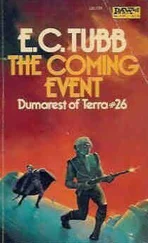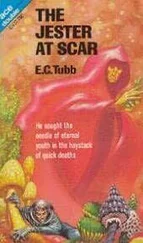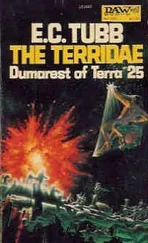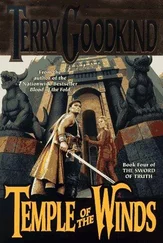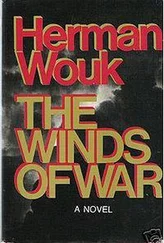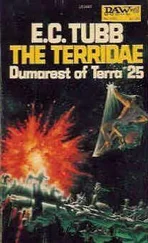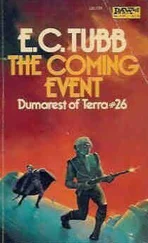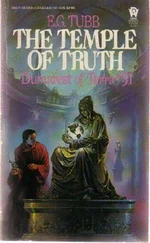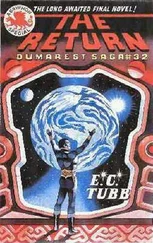Perhaps guile could be.
"The Matriarch will thank you for what you have done, Prince," she said. "Return me to her, unharmed, and you will have a friend for life."
"I don't want a friend!" He was petulant, dangerous in his anger. "I have many friends and can buy more."
"No, My Lord." She sensed his rage and guessed its cause. The fury of the storm had ruptured delicate cells in his brain. His physician, unlike Dyne, had not made provision to combat the harmful vibrations.
"You say 'no!' " His good humor had evaporated. "How long will it be. My Lady, before you change your tune?"
"Are you tired of me so soon, My Lord?"
"No. Never that!" His eyes glowed as he looked at her. "You know, My Lady, it is time I settled down. You would make an excellent wife. You shall make an excellent wife. Soon we shall arrive at the field. A ship will take us to Emmened. Elgar can take care of things on Gath. By the time he rejoins us you will be well on the way to providing me with an heir."
She remained calm. She had guessed what was in his mind from the beginning.
"Well?" His eyes searched her face. "Does not the prospect please you?"
"Yes, My Lord."
"It does?"
"Of course, My Lord," she lied. "You are rich and powerful and a handsome figure of a man. Why should I object to becoming your wife?"
He smiled at her, his good humor restored. He leaned close, his breath wreathing her face, the vapor stinging as it turned to frost.
"A hundred men shall fight to the death to celebrate our mating," he murmured. "I shall garland you with entrails and let you hack the living flesh from shackled slaves. Our passion will be fed with pain. The worlds will have reason to remember our union until the end of time."
She smiled despite the crawling of her flesh. He was quite insane.
"Are you sure?" Melga frowned her puzzlement.
"The nightside." Dumarest stared at the scene depicted in the mirror. The girl, the prince, his guards seemed like tiny manikins, their shadows dancing in the pale glow of torches. A creeping chill seemed to seep from the frame.
"Surely, if he wanted to abduct her, he would have made for the field by the shortest route."
"Perhaps he is," said Dumarest shortly. "Or perhaps he hopes to throw us off pursuit. This mirror gives us an advantage. The point is—how do we stop him?"
He looked from the physician to the captain of the guard. Elspeth had a stubborn set to her jaw.
"The Matriarch must be protected," she said flatly. "That is my first duty."
"Agreed. But you have spare guards?"
"A few."
"Then send them to the field. They are to travel at a run. If they arrive before the prince they are to stop him and rescue the Lady Thoth no matter what the cost. Is that understood?"
She nodded, glaring at him as if tempted to deny his right to give orders, then she swung from the room and Dumarest could hear her hard voice rapping orders. The physician shook her head.
"They won't make it in time," she said. "The prince has too great a lead."
"Perhaps."
"You said they might be taking a shorter route," she insisted. "And, even if the guards do arrive in time, what can they do? They are outnumbered."
"They can fight."
"And die," she agreed. "But will that save the ward of the Matriarch?" Her eyes probed his face. "You have a plan," she said. "Tell me."
"You have supplies of slow-time?"
"Yes." She guessed his intention and her mouth set in a stubborn line. "No," she said. "You can't do it. The risk is too great."
"I accept the risk." He met her eyes, his determination matching her own. "I know what I'm doing. It's the only possible way to catch them in time. Now get me the drug." His face darkened as she hesitated. "Hurry, woman! Or is the drug of greater worth than the girl?"
The insult was undeserved. He knew it and apologized when she returned. Her flush told of her appreciation.
"You said that you knew what you were doing but few have used slow-time in the conscious state. The dangers are too great. It isn't just a matter of living faster, you know."
"I know."
"I hope that you do." She handed him a small bag. "These glucose tablets might help. You're going to need all the energy you can get. Unconscious you'd be no problem; I could supply intravenous feeding and your energy-demand would be relatively low. Conscious—" She broke off. "Well, you know about that. Just remember that the square law comes into effect on food requirements and about everything else."
"I'll remember."
"You'd better." She looked down at the hypogun gleaming in the light. "What I'm really trying to say is that you must be very careful. Do you understand?"
He nodded.
"All right. But just remember to take things slowly. Slowly!" She raised the hypogun and aimed the blunt snout at his throat. "Good luck."
She pressed the trigger.
He felt nothing, not even the air-blast carrying the drug into his bloodstream but, with shocking abruptness, the universe slowed down. It hadn't, of course. It was just that his own metabolism, reflexes and sensory apparatus had suddenly begun operating at almost forty times the normal rate. The danger lay in accepting the illusion of a slowed universe as reality.
He moved from where the physician stood poised on the balls of her feet, the hypogun still in her hand, her finger hard against the trigger. The light seemed dull, tinged with a pronounced reddish cast and the tiny figures depicted on the mirror-screen had frozen into rigid immobility.
He stepped to the door and pulled aside the barrier. The thin material moved reluctantly as if made of lead. He stepped through, passed an immobile, vacant-eyed guard, reached the outer door. The material was thicker, heavier; he strained for minutes before it would move. Ducking through the opening he walked from the tents to the plain.
Steadily he began to walk toward the nightside. A wind rose about him as he walked, roaring past his ears, building up into an almost solid wall of air against which he stooped, fighting the hampering restriction. The ground felt soft beneath his feet, the stars reddish points in the sky.
Suddenly he tripped and fell, drifting down like a feather but hitting the ground with savage force, jarring his bones and ripping a patch of skin from the side of his face. He lay gasping from the shock, cold with the fear of injury. Climbing to his feet he examined the ground, noting the deep indentation made by his foot, the equally deep but much longer gouge torn by his falling body. The wind had stopped and gave him the answer. He had hit the ground with the impact velocity of about fifty miles an hour. Only fantastic luck had saved him from serious injury.
Cautiously he continued his journey. He ate as he walked, sucking at the tablets of glucose which were strangely hard and slow to release their energy. He had plenty of time to think. He was living at about forty times the normal rate but could not walk at a normal speed. A normal speed, for him, was over a hundred miles an hour but at that speed wind resistance made progress impossible. His clothes too presented a problem. His speed had increased but not his strength and he felt as if he were clothed in lead. The inertia of his garments aided the wind in slowing him down to a steady thirty miles an hour.
It was fast enough. It was ten times the traveling speed of a party moving over rough and unfamiliar ground and he would catch up with the prince even allowing for time wasted in search and following barren trails.
Ten times as fast—but he needed more than ten times the energy to do it.
In slow-time a man would starve to death before he had a chance of growing old.
THE ROOM was very quiet, the lights soft, the air tainted with the odor of antiseptics beneath the comforting scent of spice. On a pneumatic mattress the Matriarch rested, almost mummy-like in her immobility, the withered pattern of her face. Bandages swathed her side and drugs coursed their slow way through her blood. She felt no pain, no trepidation, only a peculiar detachment as if her mind were divorced from her body so that she could ponder events with an objective viewpoint.
Читать дальше

